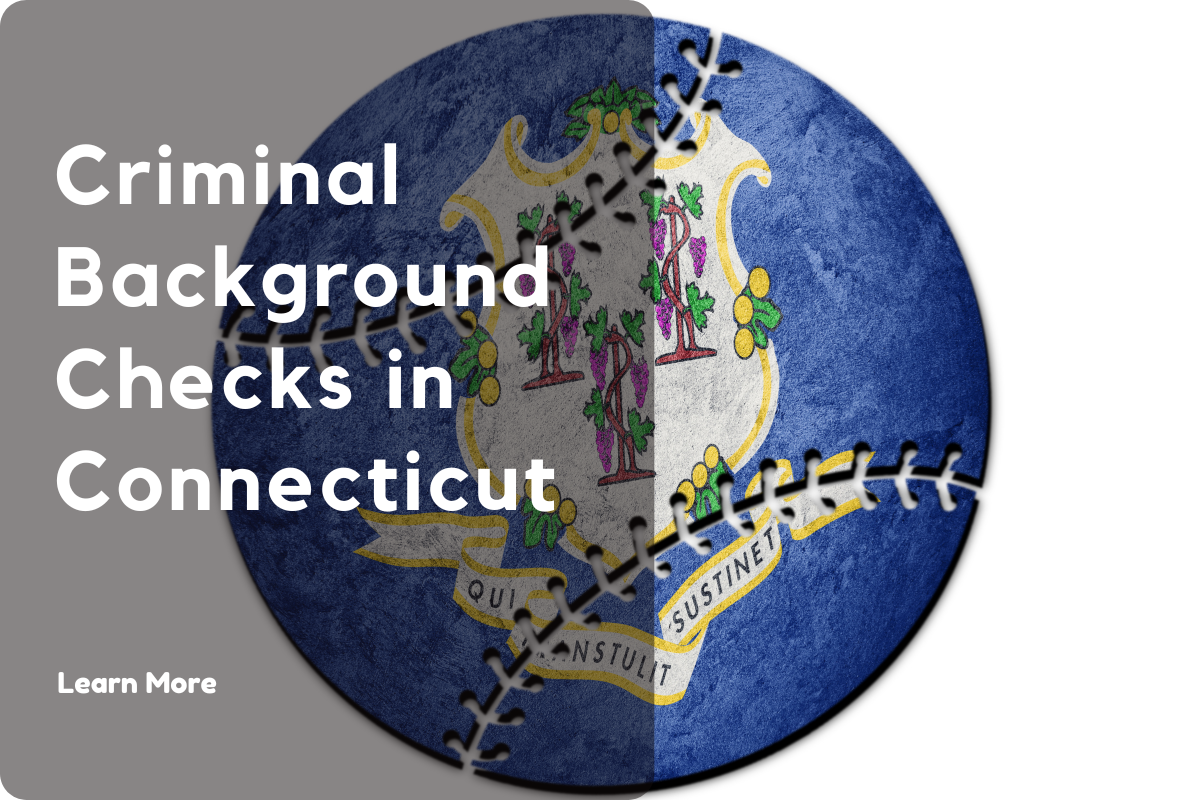 Introduction to Criminal Background Check in Connecticut (CT)
Introduction to Criminal Background Check in Connecticut (CT)
What is a Criminal Background Check in Connecticut?
In today’s competitive job market, ensuring a safe and secure workplace is a top priority for employers. One of the most effective tools in employment screening is a criminal background check. In Connecticut (CT), this check plays a vital role in helping employers make informed hiring decisions and mitigate potential risks to their business and workforce.
A criminal background check involves reviewing an individual’s criminal history to determine whether they have a record of criminal convictions. The purpose of conducting such checks is to assess an applicant’s trustworthiness, assess the potential risks associated with hiring them, and ensure compliance with laws and regulations.
Purpose of Criminal Background Checks in the Hiring Process
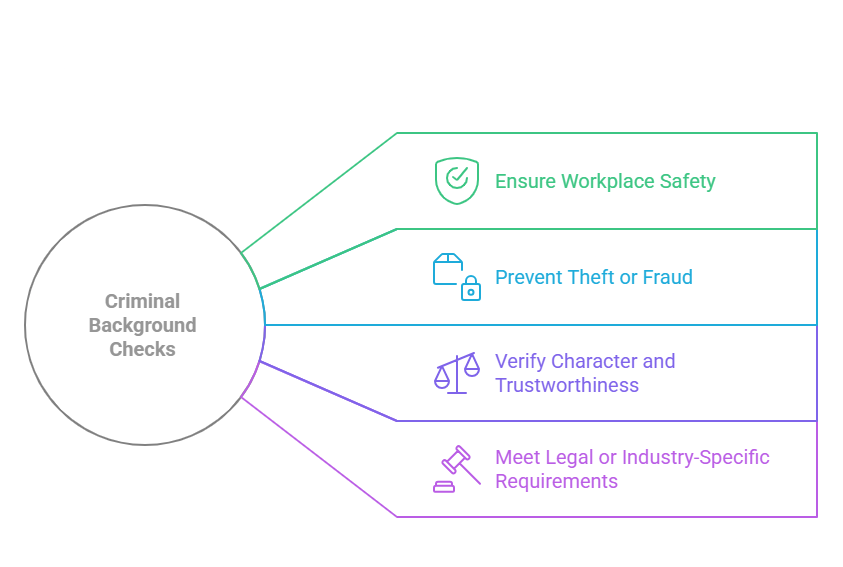
The primary purpose of a criminal background check is to verify an applicant’s past behavior, specifically any criminal activities, which could pose a risk in the workplace. Employers often use criminal background checks to:
- Ensure workplace safety: Checking for violent crimes or other serious offenses can help maintain a safe environment for employees and customers.
- Prevent theft or fraud: Certain positions, particularly those involving financial responsibilities or access to sensitive information, require additional scrutiny to prevent fraud or theft.
- Verify character and trustworthiness: Criminal background checks provide insight into the applicant’s reliability and integrity, especially in roles requiring high levels of trust.
- Meet legal or industry-specific requirements: Some industries, like healthcare, education, and finance, require criminal background checks as part of their regulatory compliance.
How Criminal Background Checks Are Conducted in Connecticut
In Connecticut, criminal background checks are typically conducted through the Connecticut State Police or the Department of Emergency Services and Public Protection (DESPP), which maintains the state’s criminal records database. Employers may also use third-party background screening companies that compile information from various sources.
Here is an overview of the steps involved in conducting a criminal background check in Connecticut:
- Obtain Consent: Before conducting a background check, the employer must obtain written consent from the applicant. This is in line with federal and state laws protecting the rights of individuals.
- Request the Background Check: The employer, or third-party provider, submits a request for a background check to the DESPP or a private screening company. In Connecticut, individuals can also request their own background check for personal review.
- Receive and Review the Report: Once the request is processed, the criminal background check report is generated. It includes details such as any criminal convictions, arrest records, and pending charges.
- Evaluate the Findings: Employers must carefully review the report, taking into consideration the nature of the offense, the time elapsed since the conviction, and the relevance of the offense to the position being filled.
Agencies Involved in Criminal Background Checks in Connecticut
- Connecticut State Police (CSP): The CSP maintains criminal records and processes requests for background checks. They provide comprehensive information on an individual’s criminal history, including arrests, charges, and convictions.
- Department of Emergency Services and Public Protection (DESPP): The DESPP manages the Connecticut State Police criminal records and handles official requests for background checks in the state.
- Third-Party Background Screening Companies: Employers may choose to use third-party providers who specialize in gathering background check information. These companies often offer nationwide and global screening services.
Importance of Criminal Background Checks for Employers
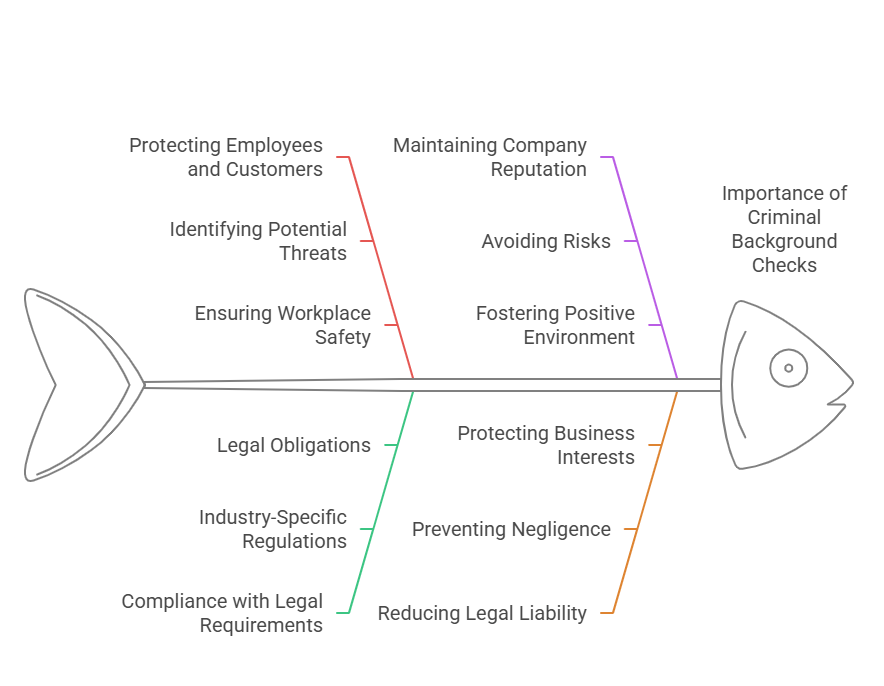
Criminal background checks are crucial for employers for a variety of reasons:
- Protecting Employees and Customers: Ensuring the safety of both employees and customers is paramount. A criminal background check helps identify candidates who may pose a threat to the workplace.
- Compliance with Legal Requirements: In some industries, background checks are required by law. For example, positions involving healthcare, childcare, or financial services may require specific criminal history screenings.
- Maintaining a Positive Company Reputation: By hiring trustworthy individuals and avoiding potential risks, employers protect their business reputation and foster a positive working environment.
- Reducing Legal Liability: Employers may be held liable for negligence if they hire an individual with a criminal record for a role that involves potential risks to others. Conducting thorough background checks helps minimize this risk.
Connecticut’s Specific Background Check Requirements
Connecticut law has specific guidelines related to criminal background checks, especially when it comes to employment. One such law is the Ban the Box law, which limits when and how employers can inquire about an applicant’s criminal history. Under this law, employers are prohibited from asking about criminal convictions on job applications. The inquiry can only occur later in the hiring process, typically after a conditional offer has been made.
Furthermore, Connecticut law provides that employers may not discriminate against an applicant solely based on a criminal conviction, unless the offense directly relates to the duties of the job for which they are applying.
Step-by-Step Process for Conducting a Criminal Background Check in Connecticut
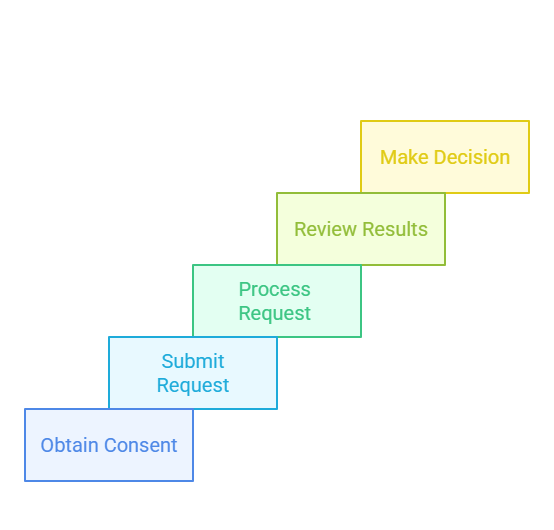
Conducting a criminal background check in Connecticut (CT) involves several critical steps to ensure that the screening process is thorough, legally compliant, and effective. Here’s a detailed breakdown of the process:
1. Obtain Written Consent from the Applicant
The first step in any criminal background check process is obtaining written consent from the candidate. Connecticut law mandates that employers must get the applicant’s explicit consent before accessing their criminal history. This is required to protect the applicant’s privacy and prevent unlawful or unauthorized checks.
This consent is typically obtained through a form where the candidate acknowledges and authorizes the background check. Employers must ensure that the consent is clear and obtained separately from the job application. It’s essential that candidates fully understand what the check involves.
2. Submit the Request to the Connecticut State Police or Third-Party Provider
Once consent is granted, employers can proceed with submitting the background check request. There are two primary ways to request a criminal background check in Connecticut:
- Connecticut State Police (CSP): Employers can submit a request for a background check directly through the Connecticut State Police, which processes background check requests through its Criminal History Record division. The request may be submitted by the employer or via a third-party background screening company. The State Police provide criminal records from their repository, which includes information about arrests, convictions, and other legal matters within the state.
- Third-Party Background Screening Companies: Many employers in Connecticut opt to outsource criminal background checks to third-party providers. These companies often have access to national, state, and federal databases and can provide a more comprehensive report that includes information beyond the state of Connecticut. These companies also ensure compliance with federal and state laws and often include additional services such as monitoring, re-checks, and in-depth analysis.
3. Processing the Request
Once the request is submitted, the processing time varies depending on the method used. For requests made directly to the Connecticut State Police, the typical turnaround time is about 1-3 business days. When using third-party services, the timeline can vary, but many companies offer expedited services that provide results within 1-2 days.
The information collected during the background check typically includes:
- Criminal History: Includes felony and misdemeanor convictions, arrests, and any pending charges.
- Arrest Records: Any criminal charges that did not result in a conviction but may still be relevant to the employment decision.
- Sex Offender Registry: If the individual is listed in the state or national sex offender registry.
- Court Records: Information about any court cases involving the individual, especially those related to criminal matters.
4. Reviewing the Results
After receiving the results, it’s critical for employers to thoroughly review the criminal background check. The results typically include a detailed report that can be overwhelming if not interpreted correctly. The following factors should be taken into consideration:
- Relevance to the Position: The most important factor in reviewing the criminal record is determining whether the offenses listed are relevant to the job role. For example, a conviction for a non-violent crime that occurred many years ago may not be relevant for an office position but could be a red flag for a role involving vulnerable populations or access to sensitive information.
- Time Elapsed Since the Conviction: The more time that has passed since the offense, the less weight it generally holds in hiring decisions. However, this depends on the nature of the offense and the specific job duties.
- Severity of the Offense: Employers should differentiate between different types of offenses. Felonies, especially violent or financial crimes, may be more concerning than minor misdemeanors. However, the context of the offense is key.
Employers must also be aware that under Connecticut’s Ban the Box law, they can only inquire about criminal history later in the hiring process—usually after a conditional offer of employment has been made. This is designed to prevent discrimination at early stages based solely on criminal history.
5. Making the Hiring Decision
Once the criminal background check results are reviewed, employers must decide whether to move forward with the hiring process. While a criminal record doesn’t automatically disqualify an applicant, employers must consider how the applicant’s criminal history may impact their ability to perform job duties or pose a risk to workplace safety.
It’s also important to consult with legal counsel if the background check reveals a criminal record. If an adverse decision (such as withdrawal of a job offer) is made based on the criminal record, employers must follow the legal process set out under the Fair Credit Reporting Act (FCRA). This process includes notifying the candidate of the potential adverse action, providing them an opportunity to dispute the findings, and following specific procedures if a dispute arises.
Benefits of Conducting Criminal Background Checks in Connecticut
Conducting criminal background checks in Connecticut offers numerous advantages to employers. These checks not only help ensure the safety of the workplace but also assist in making well-informed decisions about potential employees. Here are the key benefits of performing criminal background checks:
1. Enhancing Workplace Safety
One of the primary reasons for conducting criminal background checks is to ensure a safe working environment. By screening candidates for criminal histories, especially violent crimes, employers can avoid hiring individuals who may pose a risk to other employees or customers. This is especially important in sectors such as healthcare, education, retail, and finance.
2. Reducing Employee Turnover
Hiring individuals with a clean criminal background can reduce the likelihood of workplace incidents and misconduct. By hiring trustworthy and reliable employees, employers can reduce turnover rates and minimize the costs associated with replacing employees. Background checks help ensure that new hires are aligned with the values and needs of the organization.
3. Ensuring Legal Compliance
Certain industries, such as healthcare, banking, and childcare, are required to conduct criminal background checks to comply with federal and state regulations. Connecticut has laws in place that mandate background checks for certain professions, such as healthcare workers and those working with children. Ensuring compliance with these legal requirements reduces the risk of fines and legal issues.
4. Protecting Company Assets and Reputation
A criminal background check can also protect the business from theft, fraud, or negligence. By ensuring that new hires have a history of trustworthiness, employers safeguard their assets, sensitive information, and business operations. Additionally, hiring individuals with clean backgrounds helps maintain a positive company reputation, which is vital in attracting customers, clients, and top talent.
5. Avoiding Legal Liabilities
Negligent hiring can result in lawsuits if an employee’s criminal history is overlooked and their actions cause harm. Employers may be held liable if they hire an individual with a known criminal record who later causes injury or damages to the company or its employees. Conducting a thorough criminal background check reduces the risk of such liabilities.
Best Practices for Criminal Background Checks in Connecticut
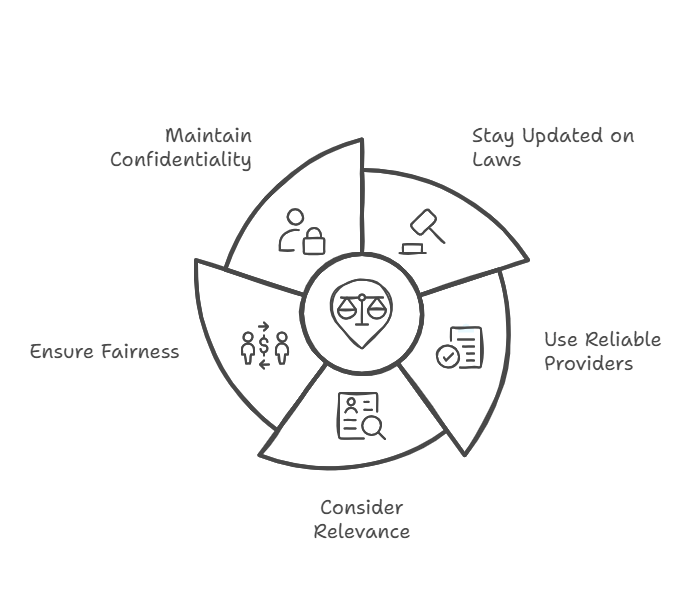
To ensure the criminal background check process is effective, employers should follow best practices. These practices not only help ensure compliance with Connecticut laws but also optimize the benefits of background checks.
1. Stay Updated on Relevant Laws
The laws surrounding criminal background checks in Connecticut are constantly evolving, particularly with respect to the Ban the Box law, Fair Credit Reporting Act (FCRA) compliance, and anti-discrimination regulations. Employers must stay informed of changes to ensure that their hiring practices are compliant with state and federal law.
2. Use Reliable and Reputable Background Check Providers
Employers should partner with reliable background check providers, especially those with a proven track record of compliance. Rapid Hire Solutions is one example of a reputable provider that offers reliable and legally compliant background check services in Connecticut. Such providers ensure that the results are accurate, timely, and in compliance with all applicable laws.
3. Consider the Relevance of Criminal History to the Job
Employers should always consider the nature of the criminal offense and how it relates to the specific job being applied for. A felony conviction for theft may be highly relevant for a position in finance, but less so for an office assistant role. Make sure to align your hiring decisions with the risks and responsibilities associated with the role.
4. Ensure Fairness and Non-Discrimination
Employers should always make sure that criminal background checks are conducted consistently for all applicants and not used as a means of discrimination. Keep in mind that under Connecticut law, applicants cannot be discriminated against for criminal convictions that are not relevant to the job position.
5. Maintain Confidentiality
Background checks contain sensitive information, and employers must take care to maintain the confidentiality of the results. Only authorized personnel should have access to the criminal background check reports, and all information should be securely stored to prevent unauthorized access or disclosure.
Legal Aspects of Criminal Background Checks in Connecticut (CT)
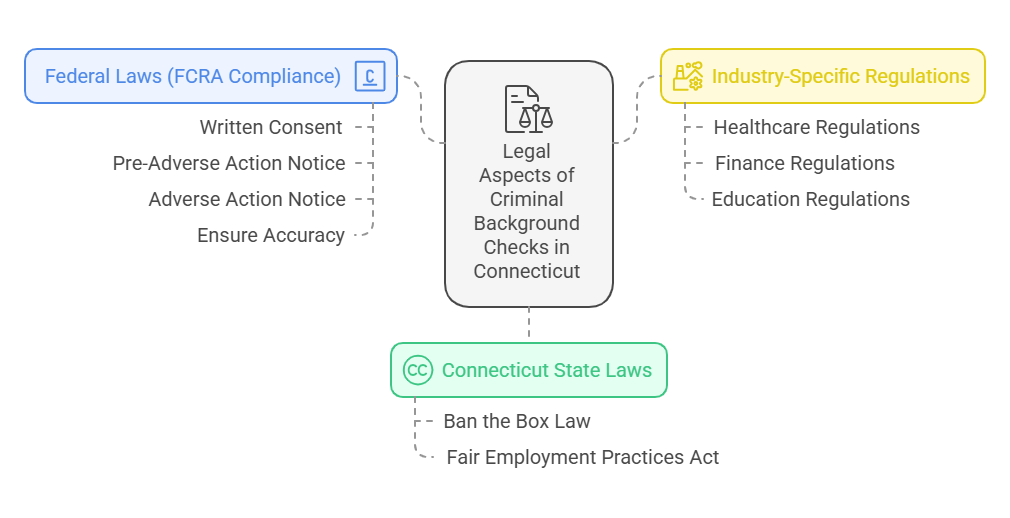
When conducting criminal background checks in Connecticut, it is essential for employers to adhere to various legal requirements and regulations to ensure compliance and avoid potential legal issues. These include state laws, federal laws, and industry-specific regulations. Here’s a deeper look at the legal landscape:
1. Connecticut State Laws
In Connecticut, employers are governed by both federal and state laws that regulate how criminal background checks should be conducted. One key state law to be aware of is the Ban the Box law. This law, which went into effect in 2017, prohibits employers from inquiring about an applicant’s criminal history until after a conditional job offer is made. The law was enacted to prevent discrimination against individuals with criminal records during the early stages of the hiring process.
The goal of the Ban the Box law is to give applicants with criminal records a fair chance at employment by focusing on their qualifications and suitability for the position before reviewing their criminal history. Employers must ensure they follow this law by delaying any inquiries about criminal history until later in the hiring process.
Additionally, employers in Connecticut must be mindful of the Fair Employment Practices Act, which prohibits employment discrimination based on arrest records or criminal convictions unless the nature of the offense is directly related to the job in question. This ensures that employers do not unfairly discriminate against applicants based on their criminal past.
2. Federal Laws (FCRA Compliance)
The Fair Credit Reporting Act (FCRA) is a federal law that governs how employers must handle background checks, including criminal background checks. Under the FCRA, employers are required to:
- Obtain Written Consent: Employers must obtain written consent from the applicant before conducting a criminal background check. This consent should be separate from the job application and clearly explain what information will be checked.
- Provide a Pre-Adverse Action Notice: If an employer intends to take adverse action (such as rescinding a job offer) based on information found in a criminal background check, they must first provide the applicant with a pre-adverse action notice. This allows the applicant an opportunity to review the results and dispute any inaccuracies.
- Provide an Adverse Action Notice: If the employer proceeds with the adverse action after the pre-adverse notice, they must send the applicant an adverse action notice, explaining the reasons for the decision.
- Ensure Accuracy: Employers must make reasonable efforts to ensure the accuracy of the information in the background check reports. This includes reviewing the reports thoroughly and ensuring the details match the applicant’s history.
Failure to comply with FCRA guidelines can lead to significant penalties, including fines and lawsuits. Employers must be diligent in following these legal requirements to avoid any potential legal complications.
3. Industry-Specific Regulations
Certain industries in Connecticut, such as healthcare, finance, and education, have additional regulations that require background checks for employees in specific roles. For example, healthcare workers, including doctors, nurses, and other staff, are subject to criminal background checks due to their access to vulnerable populations. Similarly, positions working with children or the elderly may require additional checks, such as those for child abuse or elder abuse.
Employers in these industries must ensure that their background check process complies with both industry regulations and general employment laws.
Frequently Asked Questions (FAQs) About Criminal Background Checks in Connecticut
Do I need an applicant’s consent to perform a criminal background check in Connecticut?
Yes. Connecticut law requires employers to obtain written consent from the applicant before conducting a criminal background check. This ensures that the applicant’s privacy is protected and that the employer follows legal procedures.
Can I deny a job offer based on an applicant’s criminal record?
Employers in Connecticut can deny a job offer based on an applicant’s criminal record, but only if the record is directly relevant to the job position. Employers must also comply with the Ban the Box law and ensure that they do not inquire about criminal history until after a conditional job offer has been made.
What does the Fair Credit Reporting Act (FCRA) require employers to do during the background check process?
The FCRA mandates that employers obtain written consent from the applicant before conducting the background check, provide a pre-adverse action notice if they intend to take adverse action based on the results, and provide an adverse action notice if the decision is finalized. Employers must also ensure that the background check results are accurate.
Are criminal background checks in Connecticut only conducted by the State Police?
No, employers in Connecticut can conduct criminal background checks through the Connecticut State Police, but many employers choose to use third-party background screening providers. These companies often offer more comprehensive reports that include national, state, and federal criminal history records.
What is the “Ban the Box” law in Connecticut?
The Ban the Box law in Connecticut prohibits employers from asking about criminal history on the initial job application. Employers can only inquire about criminal records after a conditional offer of employment is made. This law aims to provide applicants with criminal records a fair chance at employment without discrimination at the beginning of the hiring process.
Conclusion
Criminal background checks are a crucial part of the hiring process for employers in Connecticut. These checks help ensure that the individuals being hired are qualified, trustworthy, and do not pose a risk to workplace safety or company assets. However, it is essential for employers to conduct background checks in compliance with state and federal laws, including the Ban the Box law and the Fair Credit Reporting Act (FCRA).
Employers must take appropriate steps to obtain consent, review results carefully, and ensure that any adverse decisions are made fairly and legally. Additionally, employers should stay updated on Connecticut’s evolving regulations and best practices for background screening to protect both their business and their employees.
By understanding the legal implications, benefits, and best practices associated with criminal background checks, employers can create a safer, more compliant hiring process that fosters trust and ensures they are making informed decisions.
